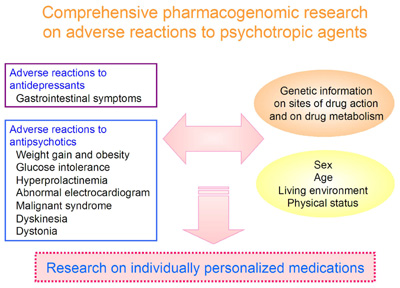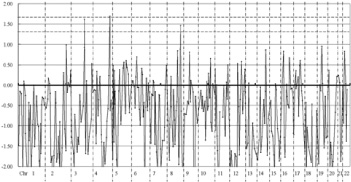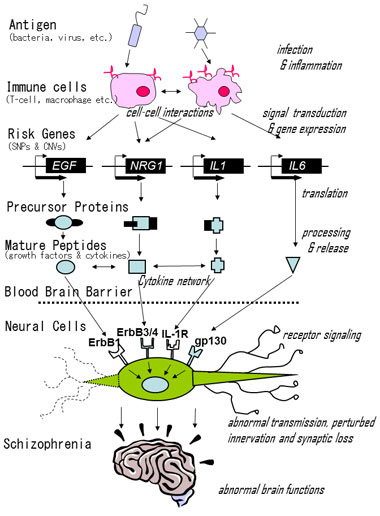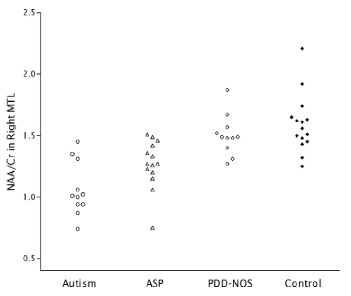1. Research Summary
The Department of Psychiatry conducts a wide range of research activities, from biological research on the origin and treatment of diseases to research directly linked to clinical practice such as diagnosis and treatment (e.g., epidemiological studies and psychoeducation), on psychiatric disorders, including schizophrenia, mood disorders, and developmental disorders.
2.Research Groups
3-1.Clinical Psychopharmacology Group
Research subjectsResearch subjects
Comprehensive pharmacogenomic research on adverse reactions to psychotropic agents
3-2.Molecular Genetics Group
Research subjects
Molecular genetic research on psychiatric disorders
3-3.Molecular Neurobiology Group
Research subjects
Molecular neurobiological research on schizophrenia
3-4.Imaging Physiology Group
Research subjects
Brain imaging of developmental disorders
Imaging and physiology in victims of large-scale disasters
3-5.Developmental Psychiatry Group
Research subjects
Large-scale epidemiological study of autism spectrum disorders in health check-ups at admission to elementary schools in Niigata City Prediction of medication responses of patients with attention deficit hyperactivity disorder
3-6.Psychoeducation, and Clinical Psychology and Psychotherapy Group
Research subjects
How psychoeducation for patients with acute schizophrenia should be conducted Clinical techniques based on developmental and dynamic viewpoints for treatment-refractory cases, including so-called “modern depression” and borderline personality disorder
4.Research Results
[Area] Psychiatry
[Research subject]
Comprehensive pharmacological research on adverse reactions to psychotropic agents
[Description]
We investigate the effects of individual differences in pharmacodynamic
factors such as various receptors and transporter proteins that are the
sites of action of drugs, as well as in pharmacokinetic factors represented
by drug-metabolizing enzymes regulating blood drug concentrations, on the
clinical effects of and adverse reactions to antidepressants and antipsychotics
using genome analysis.
Currently, samples are being collected and genetic information useful for
the prediction of clinical effects and adverse reactions are being accumulated.
We aim to establish personalized treatment appropriate for each individual
in the future by conducting further investigations.
In addition, we collect samples for verifying the objective diagnosis of,
and the effects of medications for, prodromal schizophrenia and simple
schizophrenia.
[Photographs]

[Area] Psychiatry
[Research subject]
Molecular genetic research on psychiatric disorders
[Description]
We conduct molecular genetic research with the aim of revealing the biological
factors associated with psychiatric disorders and are contributing to the
development of new therapies based on these biological factors.
We performed linkage analysis of a multiplex schizophrenia family for the
first time in Japan and identified 3q and 4q as candidate regions (Figure)
(Am J Med Genet B, 2007). We also participated in a multicenter study and
contributed to its achievements such as the identification of disease-susceptible
genes (Mol Psychiatry, 2012). We are proceeding with analyses of autism
spectrum disorders and panic disorder as well and have produced many promising
results (Psychiatry Res, 2012).
[Photographs]

[Area] Psychiatry
[Research subject]
Molecular neurobiological research on schizophrenia
[Description]
We conduct collaborative research with other departments, including the
Department of Molecular Neurobiology, Brain Research Institute, with the
aim of elucidating the pathology of schizophrenia.
Based on the cytokine hypothesis for schizophrenia (Figure) (Psychiatry
Clin Neurosci, 2010), we identified abnormal cytokine expressions in postmortem
tissues and peripheral blood from patients (Mol Psychiatry, 2000) and created
an animal model employing neonatal cytokine administration (Neurosci Res,
2004). We established a diagnostic classification prediction model based
on transcriptome analysis of peripheral blood and demonstrated that the
schizophrenia patient group and the control group can be differentiated
with high sensitivity and specificity using this model (Schizophr Res,
2010).
[Photographs]

[Area] Psychiatry
[Research subject]
Brain imaging of developmental disorders
[Description]
We conduct brain imaging research with the aim of establishing biological
diagnostic methods for developmental disorders.
We have thus far observed an amygdala neurodevelopmental disorder in autism
spectrum disorder (ASD) and reported that the extent of this neurodevelopmental
disorder increases with an increase in the severity of ASD (Figure) (Biol
Psychiatry, 2007). In addition, we presented a significant association
between a neurodevelopmental disorder of the medial prefrontal cortex and
serotonin transporter polymorphism in ASD (Psychiatry Res; Neuroimaging,
2010a). In addition, we reported that thalamic volume was decreased in
ASD and that the left-side dominance of prefrontal cortical activity observed
in healthy individuals was decreased in ASD (Psychiatry Res; Neuroimaging,
2010b, 2012).
We also analyze visual perception in ASD using magnetoencephalography.
[Photographs]

Please see the Psychiatry website for a detailed description of our research.
